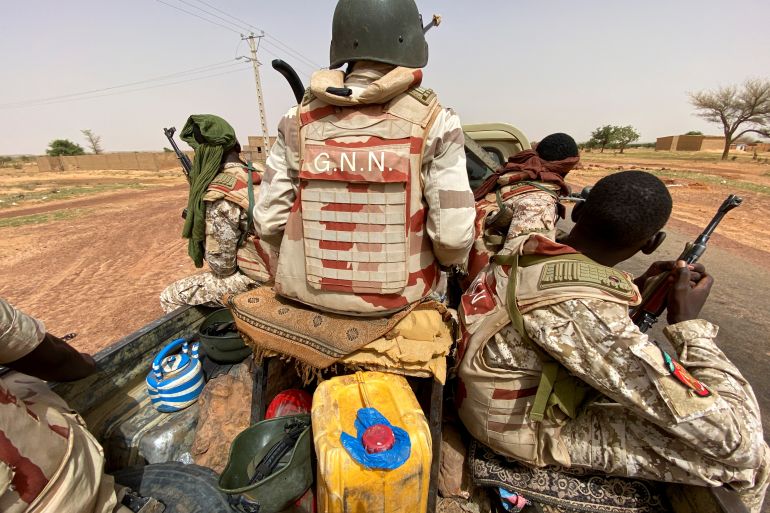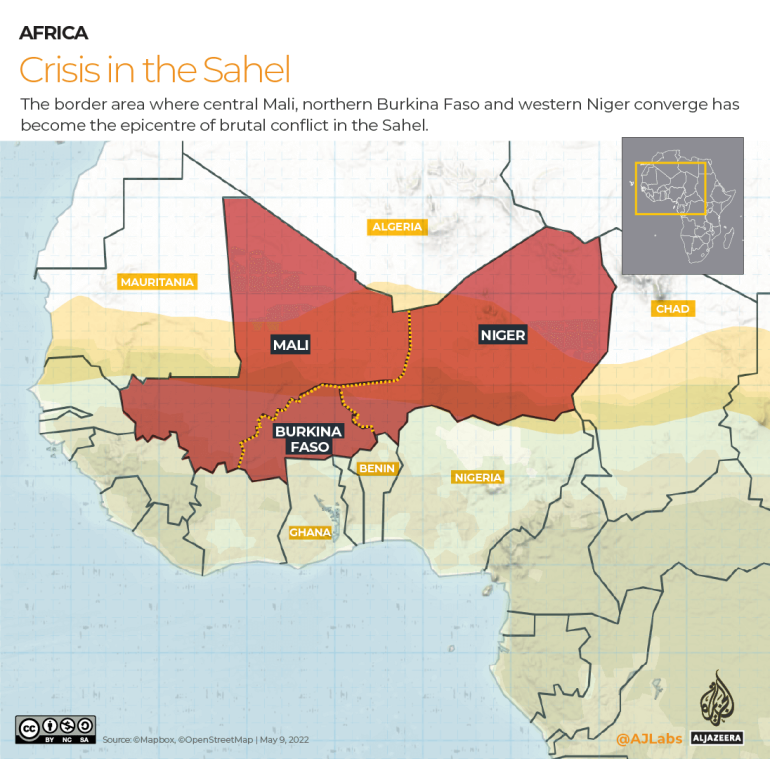Analysis: Can Niger become the main Western ally in the Sahel?
Niamey has consistently presented an image of a friendly and reliable partner to the international community and used Western aid to boost its military strength.

As France and its European allies leave Mali in a dramatic divorce due to coups and rising anti-French sentiment, Niger is becoming the latest hub for Western militaries struggling to tackle the decade-long conflict in the Sahel region.
Last month, the Nigerien parliament approved a bill paving the way for the redeployment of two French-led counterterrorism missions, Operation Barkhane and the European Task Force Takuba from Mali to the country.
Keep reading
list of 4 items‘Unconscionable’: US sends dozens to Haiti on deportation flight
Ten years after Chibok girls kidnapping: One woman’s struggle to move on
Gunmen kill at least 11 in two attacks in Pakistan’s Balochistan
Yacine Ben Mohamed, a member of the ruling coalition which voted in favour of the bill, said “Niger alone can not lead the war against terrorism” and needed partners. “So we have made our choice, France,” the lawmaker said.
About 2,400 French soldiers and 900 special forces personnel in the French-led Takuba forces are expected to leave Mali in the coming months due to deteriorating relations with the military government there.
Since 2012, when rebel groups in Mali began fighting against the state, the campaign of terror has spread to other countries across the Sahel, including Niger.
Various armed groups linked to al-Qaeda and ISIL (ISIS) have exploited local dissatisfaction, intercommunal tensions and the absence of governance to grab territories in large swaths of ungoverned areas and shake the political establishments in the Sahel capitals.
Over time, the border area where central Mali, northern Burkina Faso and western Niger converge has become the epicentre of brutal conflict in the Sahel.

Oasis of stability
For keen watchers of the region, the outcome of the vote was not surprising.
Over the last decade, Niger has presented itself as an oasis of stability in the troubled region and a reliable partner for Western countries who are worried that the spread of violence would damage their economic interests and further exacerbate the African migration to Europe. On the flipside, that has helped it use Western aid to boost its military strength.
In February, Nigerien President Mohamed Bazoum publicly endorsed France’s decision to move its troops from Mali amid a breakdown in ties between Paris and Bamako. Furthermore, parties in the ruling coalition threw their unwavering support behind the idea of incoming foreign forces, last March.
That decision to host European forces is “the most recent episode in over a 10-year-old policy that has remained constant throughout”, Rahmane Idrissa, a senior researcher at the Africa Studies Centre of Leiden University, told Al Jazeera.
“Given the chaos that followed the fall of Libya’s Gaddafi in 2011, the analysis in Niamey was that the security situation will deteriorate very seriously in the region,” Idirssa said. “From that point on, the government called for Western help, both French and American.”
Nigerien troops have become an integral part of France’s counterterrorism mission Operation Barkhane and the US’s Trans-Saharan Counterterrorism Partnership, hosting a French military base and a US airbase within its territory.
In Niamey, Germany runs a logistics outpost and like Italy and Canada, is involved in the training of Nigerien special forces.
In 2015, the West African country passed a controversial anti-smuggling law criminalising the transport of migrants throughout West Africa in exchange for European aid and development assistance.
It was a significant move coming as the European Union was overwhelmed with Africans reaching its southern shores and given that the northern city of Agadez is a key hub along the trans-Saharan migration route.
Although the number of refugee crossings has since drastically decreased, the plan had been criticised for damaging fragile local dynamics and exacerbating insecurity in the region.
Niger’s positive image was further solidified when Issoufu announced he wouldn’t revise the constitutionally mandated two-term presidential limit, unlike some other African leaders. It was a calculated move meant to avoid a possible military coup at home. That led to global headlines celebrating the “first peaceful transition of power in Niger’s history” at a time military coups were re-emerging as a trend in West Africa.
“Issoufou knew that he only had to clear a minimum bar to appear like a democrat,” said Alex Thurston, assistant professor of Political Science at the University of Cincinnati.
Bazoum, a former interior minister and candidate from Issofou’s Nigerien Party for Democracy and Socialism, was elected president in the February 2021 election. French President Emmanuel Macron welcomed the “peaceful transfer of power”, despite widespread accusations of fraud by the opposition.
“The West looked the other way as authorities leveraged the law to constrain the ambitions of Hama Amadou [Issoufou’s rival has been imprisoned and barred from running as an opposition candidate in the last election],” Thurston told Al Jazeera. “Western governments also did not scrutinize the 2016 and 2020/2021 elections, both of which had irregularities.”
A ‘blank cheque’
Experts say Bazoum is nevertheless also taking a risky bet that the benefits of the French presence outweigh the risks of fuelling anti-French sentiment among citizens.
Already, parliament’s decision to host more European forces has been met with widespread criticism from opposition parties, civil society groups and the wider public, all increasingly sceptical about France’s role in the region.
Soumana Sanda, a member of the opposition Moden Fa Lumana party, said they were not allowed to see and analyse the terms of the agreement, which he described as the government’s “blank cheque”.
Civil society groups have rejected the plan as they say it would not serve the interests of Nigeriens.
“Same causes produce the same effects,” Amadou Arouna Maiga, the head of Tillaberi Union Committee for Peace and Security told Al Jazeera. “The insecurity in Mali has hardly changed, it has even worsened. So their presence will not make difference in Niger … as the former French President Charles de Gaulle said France has no friends, only interests.”
It is a perspective being echoed by Maikoul Zodi, Niamey-based national coordinator of Pan-African democratic advocacy group Tournons La Page, who says foreign forces have been proved to be ineffective despite a decade of operation in the Sahel.
“We need beneficial partnerships for the development of our nation,” Zodi said. “The cooperation with Europe and France as its leader is unbalanced and does not take into account the interests of the people of Niger.”
There are substantial risks to such a partnership, Thurston warns, because “if the cycle of security force abuses, civilian mistrust, and jihadist attacks intensifies … the French and Bazoum will take the bulk of the blame.”
And that chain reaction as seen elsewhere in the region could trigger a similar outcome in the seat of power.
In March, following Bazoum’s victory, there was a foiled coup. Within the army, various factions still linger and there are fears that there may be other attempts to capture the power by taking advantage of rising anti-French sentiment and the recent wave of military takeovers in the region.
“It is a vicious circle,” Idrissa said.